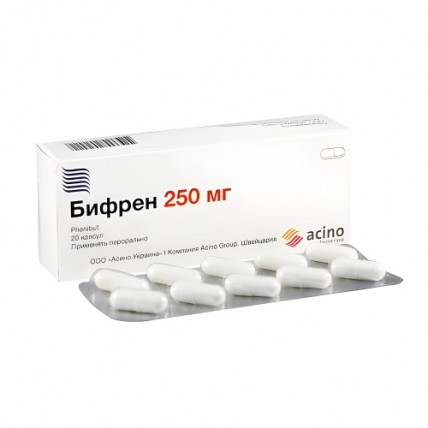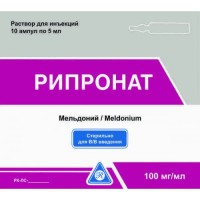Bifren (Phenibut) 250 mg, 20 Capsules
- $20.00
Out Of Stock
Bifren - an analogue of Phenibut and Noophenum (Noofen), has tranquilizing properties, stimulates memory and learning, increases physical performance; eliminates psycho-emotional tension, anxiety, fear and improves sleep; lengthens and enhances the effect of sleeping pills, neuroleptic and anticonvulsants.
One capsule contains the active ingredient - Phenibut 250 mg
Administered orally before eating food with water.
Adults are prescribed 250-500 mg 3 times a day. Higher single doses: for adults - 750 mg, for patients over 60 years old - 500 mg. The course of treatment is 4-6 weeks.
Children over the age of 11 years - 250 mg 2-3 mg per day.
Bifren can be combined with other psychotropic drugs, this increases its effectiveness. In this case, you can reduce the dose of the drug Bifren and other drugs used simultaneously.
For relief of alcohol withdrawal syndrome Bifren in the first days of treatment is prescribed 250-500 mg 3 times a day and 750 mg at night with a gradual decrease in the daily dose to the usual for adults.
To eliminate dizziness with dysfunction of the vestibular apparatus of an infectious origin (otogenic labyrinthitis) and Meniere's disease during an exacerbation, Bifren is prescribed 750 mg 3 times a day for 5-7 days, with a decrease in the severity of vestibular disorders - 250-500 mg 3 times a day within 5-7 days and then - 250 mg 1 time per day for 5 days. With a relatively mild course of diseases, Bifren is taken 250 mg 2 times a day for 5-7 days, and then - 250 mg 1 time a day for 7-10 days.
To eliminate dizziness with dysfunction of the vestibular apparatus of the vascular and traumatic genesis, Bifren is prescribed 250 mg 3 times a day for 12 days.
For the prevention of motion sickness in conditions of sea navigation, it is prescribed in a dose of 250-500 mg once one hour before the expected start of rolling when the first symptoms of seasickness appear. The effect of the drug Bifren increases with an increase in the dose of the drug. In the presence of severe manifestations of seasickness (vomiting, nausea), the administration of the drug is ineffective even at a dose of 750-1000 mg.
For the complex treatment of women with osteochondrosis of the cervicothoracic spine and climacteric disorders, 250 mg is prescribed 3 times a day for the first 2 weeks, in the next 2 weeks - 250 mg 2 times a day. In the case of moderate severity of vertebrogenic pain syndrome and climacteric disorders, it is recommended to use the drug Bifren in a dose of 500 mg (250 mg 2 times) daily for 4 weeks of complex treatment of osteochondrosis.
If one or more doses have been missed, continue taking in the previously prescribed doses, if necessary or if the patient's state of health worsens, consult a doctor.
Determination of the frequency of side effects is carried out in accordance with the following criteria: very often (≥ 1/10), often (≥ 1/100 to <1/10), infrequently (≥ 1/1000 to <1/100), rarely ( ≥ 1/10000 to <1/1000), very rare (<1/10000), the frequency of manifestation is unknown (cannot be determined from the available data).
Rarely
From the immune system: allergic reactions, including rash, itching, hives, redness of the skin.
The frequency of manifestation is unknown (cannot be determined from the available data)
From the side of the nervous system: drowsiness (at the beginning of treatment), headache and dizziness (in doses above 2 g per day, with a decrease in the dose, the severity of side effects decreases).
From the gastrointestinal tract: nausea (at the beginning of treatment), vomiting, diarrhea, pain in the epigastric region.
From the liver and biliary tract: hepatotoxicity (with prolonged use of high doses).
Mental disorder: emotional lability, sleep disturbance (these adverse reactions can be observed in children when the drug is used not in accordance with the instructions for use).
Bifren can be used with other drugs, including tranquilizers and antipsychotics, since their effects can be mutually reinforced.
Caution should be exercised in patients with digestive tract pathology due to the irritable action of Bifren. These patients are prescribed reduced doses. With prolonged use, the cellular composition of the blood, indicators of functional liver tests are monitored.
Children
The drug can be used in children over the age of 11.
Application during pregnancy and lactation
The use of the drug Bifren during pregnancy or lactation is contraindicated, since there is insufficient data on the use of the drug during this period.
The ability to influence the reaction rate when driving motor transport or other mechanisms
Patients who develop drowsiness, dizziness or other disorders of the central nervous system during treatment with the drug should refrain from driving vehicles or working with other mechanisms.
Bifren is a low-toxic compound, only in a daily dose of 7-14 g with prolonged use it can be hepatotoxic (eosinophilia and fatty degeneration of the liver were observed).
Symptoms: drowsiness, nausea, vomiting, possible development of arterial hypotension, acute renal failure.
Treatment: gastric lavage. Therapy is symptomatic.
In case of complications (arterial hypotension, renal failure), auxiliary and symptomatic measures are used.
Release form and packaging
10 capsules in a blister strip made of polyvinyl chloride film and lacquered aluminum foil.
2 blister packs, together with instructions for medical use in the state and Russian languages, are placed in a cardboard box.
Store in its original packaging at a temperature not exceeding 25 ° C.
Keep out of the reach of children!
Shelf life - 2 years
Do not use after the expiration date
Structure
One capsule contains the active ingredient - Phenibut 250 mg
Indications for use
- Asthenic and anxious-neurotic states: anxiety, fear, anxiety; in elderly patients - insomnia, night anxiety; prevention of stress conditions before surgery
- Meniere's disease and dizziness associated with dysfunction of the vestibular analyzer of various origins
- Prevention of kinetosis (a specific violation of the vestibular apparatus with characteristic symptoms: general malaise, nausea, vomiting associated with being on a moving vehicle, for example, a boat or an airplane)
- Treatment of stuttering and tics in children
- An auxiliary agent in complex treatment for the relief of alcohol withdrawal syndrome
Method of administration and dosage
Administered orally before eating food with water.
Adults are prescribed 250-500 mg 3 times a day. Higher single doses: for adults - 750 mg, for patients over 60 years old - 500 mg. The course of treatment is 4-6 weeks.
Children over the age of 11 years - 250 mg 2-3 mg per day.
Bifren can be combined with other psychotropic drugs, this increases its effectiveness. In this case, you can reduce the dose of the drug Bifren and other drugs used simultaneously.
For relief of alcohol withdrawal syndrome Bifren in the first days of treatment is prescribed 250-500 mg 3 times a day and 750 mg at night with a gradual decrease in the daily dose to the usual for adults.
To eliminate dizziness with dysfunction of the vestibular apparatus of an infectious origin (otogenic labyrinthitis) and Meniere's disease during an exacerbation, Bifren is prescribed 750 mg 3 times a day for 5-7 days, with a decrease in the severity of vestibular disorders - 250-500 mg 3 times a day within 5-7 days and then - 250 mg 1 time per day for 5 days. With a relatively mild course of diseases, Bifren is taken 250 mg 2 times a day for 5-7 days, and then - 250 mg 1 time a day for 7-10 days.
To eliminate dizziness with dysfunction of the vestibular apparatus of the vascular and traumatic genesis, Bifren is prescribed 250 mg 3 times a day for 12 days.
For the prevention of motion sickness in conditions of sea navigation, it is prescribed in a dose of 250-500 mg once one hour before the expected start of rolling when the first symptoms of seasickness appear. The effect of the drug Bifren increases with an increase in the dose of the drug. In the presence of severe manifestations of seasickness (vomiting, nausea), the administration of the drug is ineffective even at a dose of 750-1000 mg.
For the complex treatment of women with osteochondrosis of the cervicothoracic spine and climacteric disorders, 250 mg is prescribed 3 times a day for the first 2 weeks, in the next 2 weeks - 250 mg 2 times a day. In the case of moderate severity of vertebrogenic pain syndrome and climacteric disorders, it is recommended to use the drug Bifren in a dose of 500 mg (250 mg 2 times) daily for 4 weeks of complex treatment of osteochondrosis.
If one or more doses have been missed, continue taking in the previously prescribed doses, if necessary or if the patient's state of health worsens, consult a doctor.
Possible side effects
Determination of the frequency of side effects is carried out in accordance with the following criteria: very often (≥ 1/10), often (≥ 1/100 to <1/10), infrequently (≥ 1/1000 to <1/100), rarely ( ≥ 1/10000 to <1/1000), very rare (<1/10000), the frequency of manifestation is unknown (cannot be determined from the available data).
Rarely
From the immune system: allergic reactions, including rash, itching, hives, redness of the skin.
The frequency of manifestation is unknown (cannot be determined from the available data)
From the side of the nervous system: drowsiness (at the beginning of treatment), headache and dizziness (in doses above 2 g per day, with a decrease in the dose, the severity of side effects decreases).
From the gastrointestinal tract: nausea (at the beginning of treatment), vomiting, diarrhea, pain in the epigastric region.
From the liver and biliary tract: hepatotoxicity (with prolonged use of high doses).
Mental disorder: emotional lability, sleep disturbance (these adverse reactions can be observed in children when the drug is used not in accordance with the instructions for use).
Contraindications
- Hypersensitivity to drug components
- Acute renal failure
- Children under 11 years old
Drug interactions
Bifren can be used with other drugs, including tranquilizers and antipsychotics, since their effects can be mutually reinforced.
Special instructions
Caution should be exercised in patients with digestive tract pathology due to the irritable action of Bifren. These patients are prescribed reduced doses. With prolonged use, the cellular composition of the blood, indicators of functional liver tests are monitored.
Children
The drug can be used in children over the age of 11.
Application during pregnancy and lactation
The use of the drug Bifren during pregnancy or lactation is contraindicated, since there is insufficient data on the use of the drug during this period.
The ability to influence the reaction rate when driving motor transport or other mechanisms
Patients who develop drowsiness, dizziness or other disorders of the central nervous system during treatment with the drug should refrain from driving vehicles or working with other mechanisms.
Overdose
Bifren is a low-toxic compound, only in a daily dose of 7-14 g with prolonged use it can be hepatotoxic (eosinophilia and fatty degeneration of the liver were observed).
Symptoms: drowsiness, nausea, vomiting, possible development of arterial hypotension, acute renal failure.
Treatment: gastric lavage. Therapy is symptomatic.
In case of complications (arterial hypotension, renal failure), auxiliary and symptomatic measures are used.
Release form and packaging
10 capsules in a blister strip made of polyvinyl chloride film and lacquered aluminum foil.
2 blister packs, together with instructions for medical use in the state and Russian languages, are placed in a cardboard box.
Storage conditions
Store in its original packaging at a temperature not exceeding 25 ° C.
Keep out of the reach of children!
Shelf life - 2 years
Do not use after the expiration date








